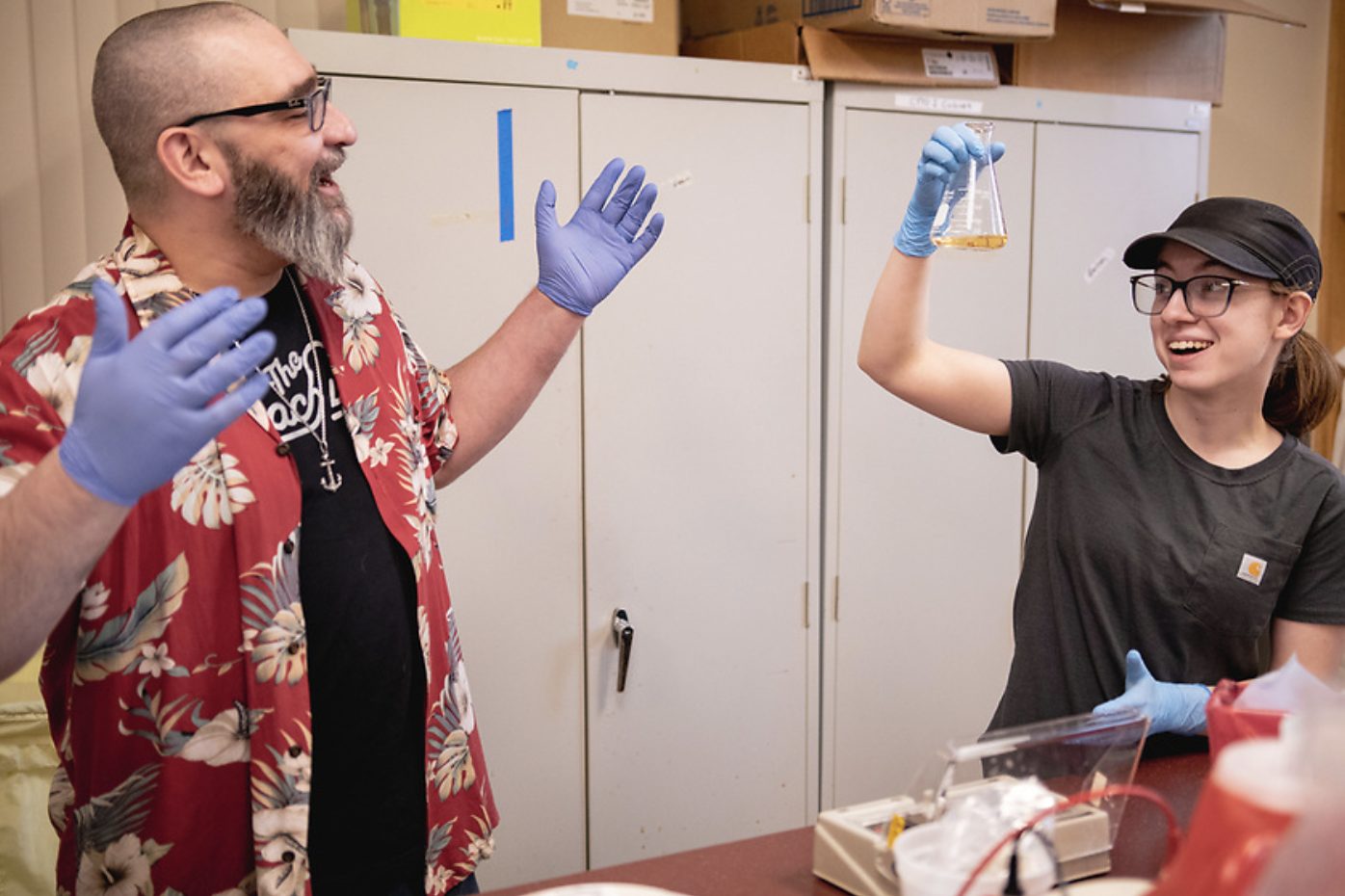
Panther Profiles are Q&A interviews that highlight Panthers of all stripes – students, faculty, staff, alumni, board members and anyone else in the campus community.
Associate Professor Timothy LaRocca, in the Department of Basic and Clinical Sciences, studies cell death and sometimes sings about it too. The focus of his research is the effect of hyperglycemia on cell death in the brain, whose medical implications include a better understanding of strokes. In 2017, he was awarded a three-year, $480,000 research grant from the National Institutes of Health to study a specific type of red blood cell death called necroptosis. Outside the lab, he is the founder of a heavy metal band called Wavecrusher, whose songs include topics related to cell death. The band will play at ACPHS Got Talent on March 18.
How did you come to study cell death?
Dr. LaRocca: When I was a graduate student, I studied Lyme disease, a bacterial infection. When I was doing a postdoc at Columbia University from 2011-2014, I was looking to see if there were some host cell responses to certain bacteria that make pore-forming toxins, which punch holes in cells.
I was working on red blood cells, the kind of donut-shaped cells in our blood. They're unique because they don't have a nucleus, they don't have mitochondria. Yet when I was studying their response to some of these pore-forming toxins, I noticed that they were dying in what appeared to be a controlled way, dependent on signaling – they were undergoing necroptosis. That was a novel discovery at the time.
That's really what sparked my interest in cell death.
Towards the end of my time at that postdoc, one of the things we were working on was the effects of high glucose on this type of cell death, necroptosis. When I came to ACPHS in 2017, we found that hyperglycemia, or high glucose, caused a shift from one type of cell death called apoptosis to necroptosis. The cell dies in both cases. But in apoptosis it's noninflammatory, whereas in necroptosis, it's highly inflammatory causing a lot of collateral damage.
That's the major discovery that we made here. Ever since then, we've been delving into how that switch works.
What are some possible implications of this work?
There is a stroke connection here, particularly one type of stroke injury called neonatal hypoxia ischemia.
What is it that appeals to you about this work?
Ever since I was a little kid, I wanted to know how things work. And now I see it could also potentially go on to help people. It's a long way down the road, but that's the exciting part too.
I’m going to shift gears. Can we talk about your music?
Sure. There are two things I love in my life: science and music. Music goes back to a younger age. I remember being really interested in different rock-and-roll bands during the MTV heyday in the early ‘90s, watching Guns and Roses videos and stuff. I got into music in maybe fifth grade.
In high school, I got more and more into heavier music, bands like Metallica, Slayer, Megadeth. I think my parents thought, let's at least have him do something productive with it. So I remember them bringing up one day, “Do you want us to buy you an electric guitar?”
I got the guitar. I fell in love with it right away. I started writing my own music straight away.
What it is that it attracts you to heavy metal?
Some people think that type of music is about anger, but that's not what it is. How do I explain it? Sometimes it gets me going. But other times – and this might sound weird – I listen to really heavy metal and it puts me at peace. It's also probably the most guitar-driven type of rock and roll out there. And as a guitarist, I want to just play lots of guitar, right?
When did you form a band?
My wife was really into working out. One of her trainers was a drummer and liked the same kind of music as me. She introduced us. We're now best friends.
Since 2017, we’ve been playing together. We both like heavy metal and older classic rock stuff too. Sometimes he'll have an idea, play it for me and then he'll hum a guitar part that he hears in his head. And it's weird – as he hums, I can transcribe it onto the guitar.
What’s the name of the band?
The band is currently called Wavecrusher. It used to be Lifelong Death. The newer name is a little less morbid.
Did you ever consider the name Cell Death?
I didn't consider that name for the band, but I have written songs about cell death. We have a song called “Necrosome.” We have a song called “Ischemia” as well.
Why Wavecrusher?
My favorite band of all time, even though I play heavy metal, is the Beach Boys. I also wear Hawaiian shirts all the time, so it goes with the image. We were joking one day like, we should do a side project where we play surf music and call it Timmy and the Wave Crashers. But then we were like, how about Wavecrusher? Wave doesn't only have to mean waves in the ocean; it could be sound waves too. And the crusher part is just to reaffirm that we are heavy metal.
You’re going to be in ACPHS Got Talent this weekend, right?
We’re not competing with the students. We're just there for fun. They put us at the end. We're almost like the headliners. So that's cool.

